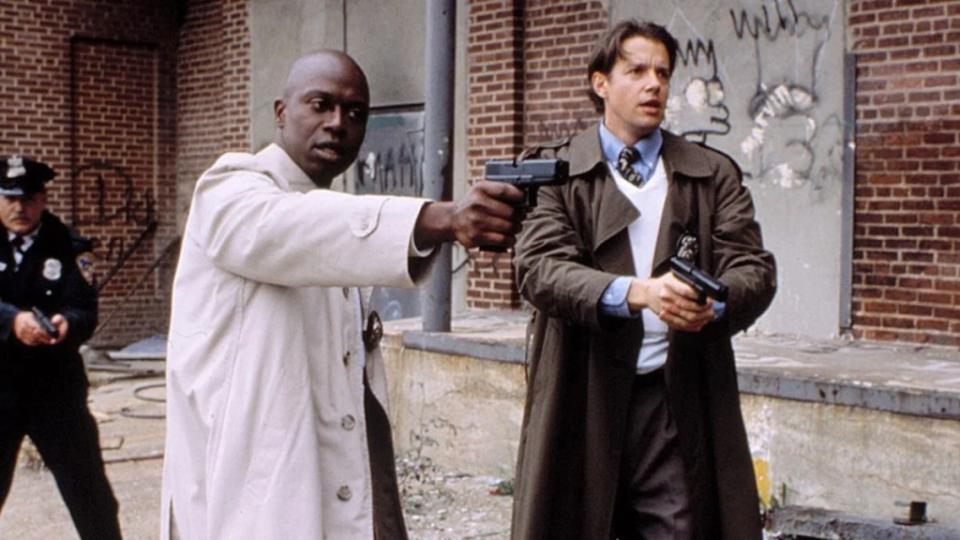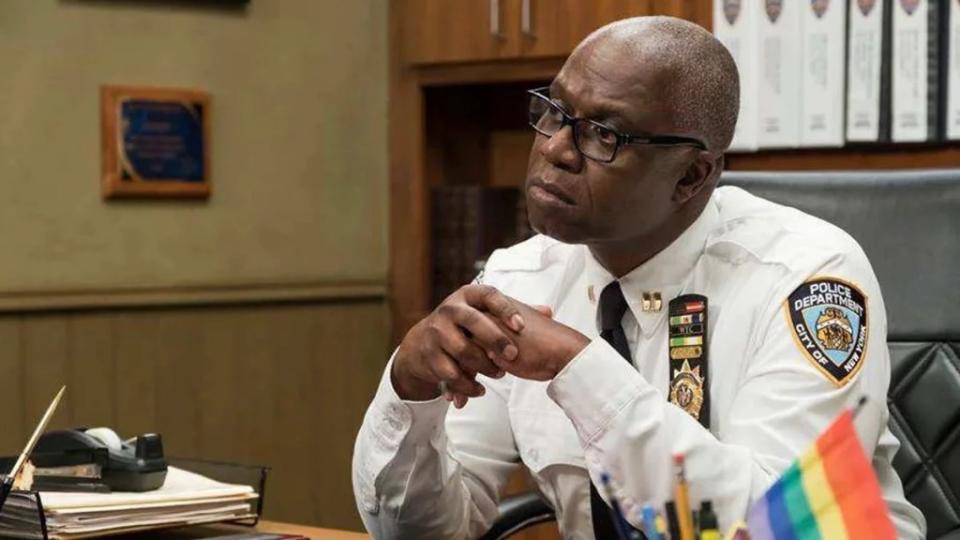Andre Braugher Redefined Modern TV With His Mastery of Drama and Comedy | Commentary
- Oops!Something went wrong.Please try again later.
The death of actor Andre Braugher at the age of 61 sent shock ringing through the entertainment industry. The two-time Emmy winner has left behind a mighty catalogue of work on stage and screens big and small.
His filmography speaks for itself, from works directed by Spike Lee and Ed Zwick to nearly 25 years of Shakespearean performances in New York theater. For the lion’s share of viewers, his legacy can be best understood through two pivotal TV roles on “Homicide: Life on the Street” and “Brooklyn Nine-Nine,” wildly different in tone yet connected through shared themes and Braugher’s mighty presence. If any actor can be said to have changed the face of modern TV in such a short space of time, it’s Andre Braugher.
“Homicide” is widely cited as one of the greatest TV series of all time for a reason. Based on the book by David Simon, NBC’s dense and ambitious police drama reshaped the entire genre for a new generation during its run from 1993 to 1999. The horrors of crime, corruption, and murder felt real in a way that the medium usually shied away from at the time. The street-smart and often sardonic detectives of the Baltimore Police Department could be funny and compelling, but the cost of the job always weighed heavily on their shoulders. Braugher’s Frank Pembleton quickly became the breakout character, and with good reason. Pembleton was a dedicated Catholic whose interrogation skills in “the Box” were legendary among his peers and prisoners.

Pembleton described his technique as being “an act of salesmanship … But what I am selling is a long prison term, to a client who has no genuine use for the product.” And boy, did Braugher sell it well. He was confident but not arrogant, because he has the goods to back it up. Blessed with one of the greatest voices of the era, Braugher’s velvety tones could command as well as unsettle. In one of the series’ most acclaimed episodes, “Black and Blue” from Season 2, Pembleton investigates the death of a small-time drug dealer who he believes was killed by a cop. The department doesn’t want him to embarrass the squad and puts pressure on him to position a young Black witness as the culprit. Furious at the obvious lies at play, Pembleton gets to work wringing a confession out of an innocent man. It’s not simply that Braugher commands the long, agonizingly drawn-out interrogation; it’s that you sense the years’ worth of pent-up frustration of a man who got into this for the right reasons and wonders what the point is anymore.
Of course he gets the confession, but there’s no satisfaction in a job well done for the wrong purpose. Braugher is a virtuoso here, and he had many other opportunities to reveal that throughout “Homicide.” In season three, Pembleton was the center of a three-episode arc on a series of murder involving religious themes, which offered him a chance to utilize his Jesuit faith amid a crisis of belief in the face of such callousness. It was theater as much as TV, turning a worn-down cop into Hamlet.
15 years after the end of “Homicide”, he got the chance to be another TV policeman, albeit one with more punchlines. The initial choice to have Braugher play Captain Raymond Holt, the buttoned-up straight man of “Brooklyn Nine-Nine” (who is anything but straight), almost felt like a gimmick. How could one of television’s greatest detectives now become the stern-faced boss for Andy Samberg and company to bounce jokes off of? Yet Holt as portrayed by Braugher was anything but a cliché. Holt is controlled to the point of absurdity, yes, but he’s always in on the gag. The toughness of a Black gay police officer surrounded by goofs of surprising competence always made room for a beating heart. Braugher’s ability to keep the most stoic of expressions while delivering some of the funniest dialogue on the series felt like a minor miracle, and only made it more hilarious when he went big.
His delivery was bone dry (“Any smile that lasts longer than a second and a half is a con man’s ruse”), right up until it was buoyant in triumph (his long cry of “Vindication!” shall forever live on in gifs across this great internet.) He wasn’t always at the top of the pecking order in the precinct, whether it was the annual madness of the Halloween heist or an extended undercover operation, but there was a reason everyone respected Holt. There was just something about Braugher that commanded admiration, even at the daftest moments. Like Pembleton, he wanted justice and he wanted it done properly. In one scene, he suspends Peralta for witness intimidation and delivers a speech of overwhelming belief in the heart of the system that one of TV’s best comedies became a rousing drama for a couple of minutes.
Holt could so easily have been a two-dimensional foil or box-ticking exercise. Braugher, however, never allowed flatness to win when he inhabited a role. Holt was remarkably lived-in from the first time we see him, watching clownish Jake Peralta (Samberg) do a bad impression of what he thought his new boss would be like. It took a lot to make Holt crack, but he was often aware of his absurdities and what other people thought of him.
The absolute precision of Holt’s language, like his refusal to use unnecessary conjunctions or ineffective acronyms, allowed Braugher to truly stretch his muscles. Why not get a Shakespearean thespian to do comedy? The Bard wrote his fair share of comedies after all, and Braugher seemed to view every word he spoke as an opportunity to elicit something special for the character. In anyone else’s hands, Holt could have been trite or insufferable. Instead, he was a person, one no more or less than Frank Pembleton.

There is so much else to cover in Braugher’s decades of good work. He played Detective Winston Blake in several Kojak TV movies, portrayed Jackie Robinson in a TV movie, and received two Emmy nominations for the underseen comedy “Men of a Certain Age.” Who else could have been Dr. House’s therapist on “House”, or a character named Woodchuck Coodchuck-Berkowitz on “BoJack Horseman”?
In his final film role in “She Said”, he shone as New York Times editor Dean Baquet, facing up against none other than Harvey Weinstein in a battle of a phone call that wouldn’t have felt out of place on “Homicide.” We cannot help but crave more of Braugher in film and TV, but he was a performer who put family first. IIn an interview with Alan Sepinwall of Rolling Stone, Braugher said, “Being a husband and a father are, in my mind, greater accomplishments than what I play on television.”
With the time that he did dedicate to his on-screen pursuits, Braugher changed the game and got to live a wonderful life with his family. Who could ask for more than that?
The post Andre Braugher Redefined Modern TV With His Mastery of Drama and Comedy | Commentary appeared first on TheWrap.

